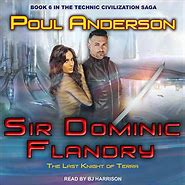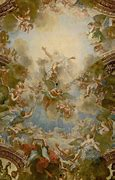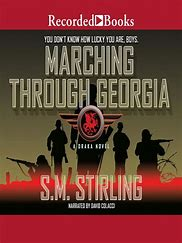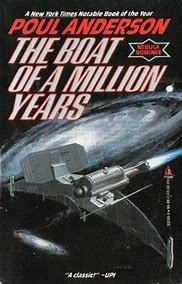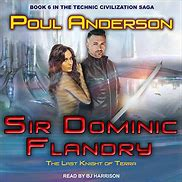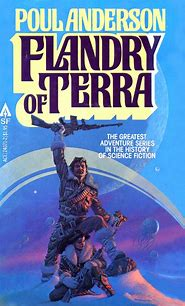Wednesday, 31 August 2022
Aircars And Monotheism
Gratitude?
A Knight Of Ghosts And Shadows.
Kossara Vymezal reflects:
"He saw deeper than most, did her Dominic, and covered the hurt of it with a jape. If only he did not see right past God. In time? I'll never preach at him, nor admit outright that I pray for him. But if we are given time -" (XVI, p. 543)
But they will not be given time. According to a monotheist, that is God's doing.
Later:
Tuesday, 30 August 2022
Flying Cars
A Knight Of Ghosts And Shadows, XVII.
In some futuristic sf, we have learned to take it for granted that "cars" fly. A car carrying Dominic Flandry and Kossara Vymezal but also "...crammed with ychans..." (p. 551) lands "...in a parking lot at the edge of Zorkagrad." (ibid.) It is one of "...a swarm of battered vehicles which was arriving." (ibid.) They land at the edge of the city first because no parking lot farther in could have accommodated them and secondly because "...a sudden appearance downtown might have provoked alarm..." (ibid.) It would have looked like an aerial invasion.
When the two local Liverpool football teams played against each other in the home ground of one of them (they are a short walk apart), some trade unionists got the brilliant idea of leafletting the fans arriving to watch the match. As one of the trade unionists, I had to park an hour's walk away. When I got there, the others were giving up on the idea. Our Branch Secretary's car was blocked in and he had to go back for it later. Imagine if all of those parked cars had descended from on high. Are flying cars feasible?
1922 (b)
The Fishers Of The Obala
A Knight Of Ghosts And Shadows, XVI.
The zmayi fishers of the Obala on the east coast of the Rodna continent on Dennitza can find some of the truth. See the previous post.
Kyrwedhin is:
Disinformation And Intelligence
A Knight Of Ghosts And Shadows.
The spreading of disinformation is a crime against the truth and against anyone who is deceived. Intelligence-gathering is a science that can counteract disinformation but can also be used for partisan purposes.
The Gospodar of the planet Dennitza governs the Taurian Sector of the Terran Empire which borders the Wilderness separating the Empire from the Merseian Roidhunate. Thus, Merseia can both threaten and influence Dennitza. Disaffected Dennitzans might welcome Merseian support or even rule. The Emperor decrees the disbanding of the Dennitzan militia. Dennitzan Intelligence reports Merseian war preparations that are denied by Terran Intelligence. Who is lying and why?
Disinformation can be internalized. Thus, the Dennitzan, Kossara Vymezal, is not only arrested for treason but also brainwashed with false memories of her own participation in treasonous activities. Arrested on Diomedes, she is quickly and quietly sold into slavery on Terra but then the news of her enslavement makes its way back to Dennitza. Merseian agents have infiltrated both Terran Intelligence and the Zamok/Castle executive centre in Zorkagrad on Dennitza.
In an inflammatory situation, who can find and make known the truth?
Monday, 29 August 2022
Dennitza And Avalon
A Knight Of Ghosts And Shadows, XVI.
Dominic Flandry and Kossara Vymezal, if married, would have worked:
"...for the future, not the poor wayworn Empire but a world he too could believe in, the world of their own blood." (p. 543)
Thus Dennitza would have been to Flandry what Avalon was to David Falkayn.
Kossara's Prayer II
Three figures that come together in my head are:
Kossara's Prayer
A Knight Of Ghosts And Shadows, XVI.
Through Poul Anderson's empathetic writing, we imaginatively enter into Kossara Vymezal's prayer. She remembers her dead: her family, her fiance, her zmay servant, every soul and every living being that was killed when her home was nuked:
Sunday, 28 August 2022
Diyu And Heaven
Daggers In Darkness, CHAPTER TEN.
One role of references to a hereafter is to comment on the here and now or on a life that has just been completed. Thus, Luz inwardly expresses the hope that a Chinese bodyguard who died in the line of duty will pass swiftly and easily "through the Courts of Diyu" (p. 174) but says "Amen" (p. 191) when a policeman of Irish descent voices a pious hope about heaven. There are works of fantasy in which people of different belief-systems survive into their appropriately diverse hereafters but perhaps not many of us would claim that that is literally the case? Again, I think that meditation is beneficial here and now but do not buy into reincarnation or rebirth. My sympathies are with Poul Anderson's Ythrian character who expresses incredulity and even incomprehension when informed of the Christian belief in a soul surviving the body and going elsewhere.
Saturday, 27 August 2022
Three Spy Novels
Northernness
Aycharaych's Art
A Knight Of Ghosts And Shadows, XII.
Human agents of Merseia foment rebellion on Diomedes. They must pretend to be Avalonians in order to encourage Alatanism, the belief among (winged) Diomedieans that they will receive solidarity and support from (also winged) Ythrians. But the Merseian operatives must also give the impression that they are Dennitzans so that the Gospodar of Dennitza will send his niece, the xenologist, Kossara Vymezal, to investigate. Aycharaych can predict how the Gospodar will respond. On Dennitza, Kossara is contacted by human agents of Merseia posing as spies from Esperance. The fake Esperanicians claim that, having heard from Diomedeans of Dennitzan involvement in the resistance movement, they themselves then posed as Dennitzans. Agents of Merseia who have infiltrated Imperial Intelligence arrest Kossara. Hypnoprobing, combined with Aycharaych's telepathy and hypnosis, suppresses some of Kossara's memories and fakes others so that she believes that she had been involved in the Diomedean resistance. She is sold into slavery on Terra in order to drive a wedge between Dennitza and Terra. Aycharaych regards this kind of operation as a work of art.
Who is the "knight of ghosts and shadows" of the title? Flandry reflects:
"I see in my mirror the specter of [Aycharaych]. Though who of us is flesh and who image?" (pp. 503-504)
Esperance
A Knight Of Ghosts And Shadows, XII.
"Esperance was near the border of Empire and Domain." (p. 501)
Indeed. Some Esperancians protested when the Terran attack on the Domain of Ythri was launched from their planetary system. The Technic History holds together in space and time.
Flandry:
Friday, 26 August 2022
Resistance
Thursday, 25 August 2022
Images
Imagine accurate adaptations of these novels into sequential art story-telling (comic strips), animations and live-action films. Poul Anderson's prose describes scenes that should be re-presented in more than one visual medium. Ythrians in flight, Merseians, Betelgeuseans, the Chereionite etc and their diverse planetary environments would look good both in cartoons and as computer-generated images.
Personally, I would appreciate a graphic novel as much as a serious screen dramatization. Each of these cover shows us what just one panel might look like.
Opposite Numbers II
Opposite Numbers
Wednesday, 24 August 2022
{ }
A Knight Of Ghosts And Shadows, IX, pp. 453-465.
This chapter begins, just two lines above the bottom of p. 453, with a bracket, thus: {. The bracket is repeated/renewed/refreshed only once, after a double space in the text, two lines above the bottom of p. 458. The bracket is closed two thirds of the way down p. 465 and only two sentences before the end of the chapter.
The brackets enclose an extended reminiscence/flashback to Flandry's last meeting with Tachwyr of Merseia and Aycharaych of Chereion on the planet Talwin near the end of the Terran civil war.
However, I have just been diverted into a philosophical discussion on email and do not feel like tackling Flandry's reminiscence this evening! There is always more.
Language
Language is an extraordinary means of communication. We enjoy conversation and reading novels - among other things. Words can convey an immense amount of information, meaning and significance in an extremely compact form. The phrase, "the universe," is a minute part of the universe but means the universe. There are times, especially in emergencies, when a two-word message or warning suffices. Imagine clinging to a life-raft in mid-Atlantic, then hearing from above the words, "Air-Sea Rescue."
When Poul Anderson's Manse Everard approaches another time traveller in a past era, he can identify himself and indicate his purpose by saying just: "Time Patrol." In fact, I would guess that "Time Patrol" is a single word or even just a single syllable in Temporal. When Everard transmits:
Diomedes, Ythri, Dennitza And Merseia
The Man Who Counts: Nicholas van Rijn starts the industrial revolution on Diomedes purely as a way to get himself off the planet.
The People Of The Wind: The Terran Empire and the Domain of Ythri fight a war to adjust an interstellar frontier.
A Knight Of Ghosts And Shadows: Some disaffected Diomedeans want to leave the Empire and join the Domain. Aycharaych, working for the rival imperium of Merseia, exploits disaffection on Diomedes and also on Dennitza in order to divide the Empire.
In a future history series, later instalments build on earlier instalments but are set generations and centuries later.
Spacefaring Diomedeans
A Knight Of Ghosts And Shadows, VI.
A text informs Flandry:
"'As producers, merchants, engineers, industrialists, even occasional spacefarers, [the Drak'ho people] flourish, and are on the whole well content.'" (p. 427)
So some Diomedeans do go into space (see my question here) but it sounds like not in their own spacecraft. The raft-, then land-, dwelling Drak'ho can assimilate technology whereas the migratory Lannachska cannot without destroying their life-style. Hence, the problems on Diomedes. Poul Anderson seems to have imagined a fundamentally insoluble social conflict. "Alatanist" Diomedeans want to be accepted into the nearby Domain of Ythri - a mystique of winged beings - but few Ythrian leaders have heard of Diomedes and none want conflict with the Terran Empire. Narrative threads from The People Of The Wind and The Man Who Counts approach each other but then recede.
Tuesday, 23 August 2022
A View On Lannach
A Knight Of Ghosts And Shadows, VI.
Dominic Flandry's spaceship, the Hooligan, has landed half way up a mountain on the large Diomedean island of Lannach:
Diomedeans In The Imperial Period
A Knight Of Ghosts And Shadows, VI.
"Progressive autochthonous cultures had brought Stone Age technology, the sole kind possible for them, to an astonishing sophistication. Once contacted by humans, they were eager to trade, originally for metals, subsequently for means to build modern industries of their own. Diomedes offers numerous organic substances, valuable for a variety of purposes, cheaper to buy from natives than to synthesize...." (pp. 418-419)
As ever, Poul Anderson displays an excellent grasp of interstellar economics: "...cheaper to buy...than to synthesize..." was the basis of the Polesotechnic League. But why did some Diomedeans not try to get into space, as the Ythrians and the Cynthians had done? Did Diomedeans join Supermetals in the League period? They are not mentioned in this connection as far as I remember.
Interstellar contact forces radical change on ancient customs. Some cultures adjust. Others suffer. But Flandry reflects that, if the Imperials were to withdraw, then all Diomedeans would be much worse off:
Four Organizations
George Orwell's Thought Police change records and memories so that it is as if the past has been changed.
The temporal bureau in Robert Heinlein's "-All You Zombies-" causes the past events that it has caused but only those.
The Service in James Blish's "Beep"/The Quincunx Of Time is an Event Police ensuring future events.
(Blog readers might recognize this as a quick breakfast post before going out for the day.)
Monday, 22 August 2022
Sensory Overload On Diomedes
A Knight Of Ghosts And Shadows, V.
"Cliffs and crags loomed in darkling solidity, here and there a gnarled tree or a streak of snow tinged pink by a reddish sun high in a purple heaven." (p. 410)
We recognize an overload of colours and immediately look for more sensations. Sure enough, the text continues:
"The wind thrust slow, strong, chill; it had not only an odor but a taste like metal." (ibid.)
So far, four senses. Next:
"A cataract, white and green half a kilometer away, boomed loud through thick air that also shifted the pitch and timbre of every sound." (ibid.)
And that is not all because Kossara feels something else:
"Huddled in her parka, she felt how Diomedes drew on her more heavily than Dennitza, nearly two kilograms added to every ten." (ibid.)
Are the sense of balance and the sensation of gravity additional senses?
(We have said all this before but in a slightly different way. See Five Senses On Diomedes.)
Inter-Timeline References
Good People In Bad Societies
Poul Anderson's Dominic Flandry cheats at poker in order to acquire a Shalmuan slave work force, then frees the slaves and arranges for their passage home. One Shalmuan, Chives, prefers to remain in Flandry's service and even refuses manumission until the control bracelets are imposed on Earth. Flandry buys Kossara Vymezal but only in order to investigate her alleged involvement in an attempted insurrection. Flandry treats Kossara with respect, initially as a prisoner of war, but then, of course, other things happen.
Incidentally, Chives was named as such by Flandry so it is possible that not only Anderson but also Flandry based this Shalmuan servant's name on PG Wodehouse's "Jeeves."
Sunday, 21 August 2022
The Bellamy Salute
Daggers In Darkness, CHAPTER FIVE.
We can learn some history by reading alternative histories. I learned about the importance of the Scipios by reading Poul Anderson's story about time travellers who eliminated the Scipios. In SM Stirling's Daggers In Darkness, a crowd in 1922(b) salutes Theodore Roosevelt by making the Bellamy Salute:
"...stand to attention, eyes front, put the right hand over the heart, and then extend that arm stiffly at a forty-five degree angle, palm up." (p. 97)
I read this passage in haste just before going out to drive my daughter and granddaughter to Morecambe seafront for a Burrito and a view of the sunset and I missed the crucial significance of that single concluding two-letter word. I misremembered the passage as stating that the palm should be "open." I practiced making the salute to see if it came out any differently to what I expected. Aileen told me to stop doing it. (Don't try this in public, folks!)
Stirling has educated me and maybe some others about the Bellamy Salute. It is so easy nowadays to google and (sometimes) clear up misunderstandings.
The Merrypark
A Knight Of Ghosts And Shadows.
I remembered that, when Kossara Vymezal anticipates married life with Dominic Flandry, one of the many activities that she envisages is taking:
"...their children to the zoo and the merrypark." (XVI, p. 544)
"Merrypark" stuck in my memory as a distinctively Dennitzan word for a fairground, children's play area or something of that sort. On rereading we learn that Gospodar Bodin Miyatovich had taken his niece, the young Kossara:
"...to the zoo and the merrypark." (II, p. 366)
I had not noticed this first use of the term but, of course, Poul Anderson was carefully building a consistent picture of life on Dennitza whether or not his readers noticed every detail. Dennitza might be my favourite planet in the Technic History although I think that of Avalon when rereading The People Of The Wind. I would certainly welcome the opportunity to meditate in the Cathedral of St. Clement, Zorkagrad. Kossara was christened and confirmed and would have been married by Father Smed but instead she lay in state:
"...St. Kossara." (XX, p. 605)
Hans Molitor
was born to colonial bourgeois parents on Germania;
had several years of wild adventure in space;
enlisted in the Terran Navy;
rose through the ranks by ability alone;
was a hero of the battle of Syrax;
was proclaimed Emperor by his personnel in the succession crisis;
is a shrewd, uncultured pragmatist;
leads an armada to quell the barbarians in Sector Spica;
will be succeeded by dull Dietrich, then by scheming Gerhart, although he would have preferred dead Otto.
When Flandry sees Hans glance at the picture of Otto, he almost reads the Emperor's mind: a Sherlock Homes stunt.
When we read in the Chronology that Hans is succeeded by Dietrich who is succeeded by Gerhart, we might ask, "Why do such details matter?" But every character does matter. In fact, did Gerhart murder Hans, then Dietrich?
Some Strong Female Characters In Fiction
a passage in Poul Anderson's A Knight Of Ghosts And Shadows where Kossara Vymezal, on vacation from the Schola and on furlough from her ground defense unit in the Narodna Vokska, hunts in the Kazan with her family's zmay (Merseian by species) gamekeeper, Trohdwyr, and kills a charging dyavo with her rifle;
SM Stirling's Daggers In Darkness about the intrepid secret agents, Luz O'Malley and Ciara Whelan;
Stieg Larsson's Millennium Trilogy about Lisbeth Salander - although I also like a long list of Larsson's male characters, including the real life Paulo Roberto;
Neil Gaiman's The Sandman, well known for its many strong female characters, notably Dream's older sister, Death.
(Grammatically, a single-sentence post until I added this parenthetical remark.)
Technologized Slavery
Saturday, 20 August 2022
A Life Of A Thousand Years
Flandry's Life-Style
Fiction And Reality II
What We Did Not Know Before
A Knight Of Ghosts And Shadows, I.
"...Josip died, and the Policy Board split on accepting his successor..." (p. 350)
Josip had been Terran Emperor in Ensign Flandry and The Rebel Worlds. Thus, the mention of his name counts as a ninth reference to earlier instalments. However, it is news to us that there was Terran civil war during the events of "Warriors from Nowhere."
Flandry mentions "'...the time I came to [Emperor Hans'] notice...'" (p. 346)
That has to be when he rescued Hans' granddaughter in "Warriors from Nowhere." For three or four years after that, Flandry was one of Hans' right hand men, persuading the marches that:
"'...they'd really rather keep Hans for their Emperor than revolt all over again.'" (ibid.)
So Josip had died, the Policy Board had split and the marches had revolted between "Hunters of the Sky Cave" and "Warriors from Nowhere." In fact:
"'...Hans had assumed, which means grabbed, the crown less than two years earlier.'" (p. 350)
So Flandry was working for a usurper at the time of "Warriors from Nowhere" and we had no idea how volatile the situation was. The text continues:
"'Everything was still in upheaval. Three avowed rivals were out to replace him by force of arms, and nobody could guess how many more would take an opportunity that came along, whether to try for supreme power or for piratical autonomy.'" (ibid.)
This is retcon: retroactive continuity. And the Empire could have disintegrated then. Flandry met his opposite numbers, Tachwyr and Aycharaych, on Talwin four years before the events of A Knight Of Ghosts And Shadows, thus shortly after "Warriors from Nowhere" but when Hans Molitor has almost won the civil war.
References To Earlier Instalments
A Knight Of Ghosts And Shadows, I.
Dominic Hazeltine's looks recall:
"...Persis d'Io as she had been when she and Flandry said farewell on a planet now destroyed, he not knowing she bore his child." (pp. 344-345)
- Ensign Flandry.
"'Fenross hated my guts.'" (p. 345)
-"Hunters of the Sky Cave" and "Warriors from Nowhere."
"...Flandry well-nigh singlehanded put down the barbarians of Scotha and was knighted for it..." (p. 346)
-"Tiger by the Tail."
"...Flandry well-nigh singlehanded rescued the new Emperor's favorite granddaughter - and headed off a provincial rebellion..." (ibid.)
-"Warriors from Nowhere."
"...the civilized Roidhunate of Merseia probed..."
-several previous instalments.
"'Remember how hard the colonists of Avalon fought to stay in the Domain of Ythri, way back when the Empire waged a war to adjust that frontier.'" (p. 351)
-The People Of The Wind.
"'Nicholas van Rijn...was shipwrecked [on Diomedes] once.'" (p. 353)
-The Man Who Counts.
"'Shall I open the Chateau Falkayn '35?'" (p. 355)
-Van Rijn's protege was David Falkayn.
Thus, eight direct or indirect references to previous instalments.
Friday, 19 August 2022
Decadent Eras
Future City
Cold Planets
Thursday, 18 August 2022
Invaders And Reavers
On Aeneas, heroes "...of the early days..." include:
Back To Basics With Poul Anderson
I suppose that the core of the Time Patrol series is the original four short stories about Manson Everard. For over a decade these four stories filled a single volume of modest length comprising the entire series. Fortunately, the series grew and not just by the addition of more stories comparable in length or content to the original four.
The core of the Technic History must be the Captain Flandry series. Before it, in terms of fictional chronology, come the Young Flandry Trilogy and much earlier history. After it, come Flandry's later career and much later history. Captain Flandry fills two collections and one novel although, of course, the contents of the collections must be rearranged so that they are read in the order of Flandry's experience:
Wednesday, 17 August 2022
Tom Mix And Joshua
Daggers In Darkness.
1922(b) has:
"...dime-store illustrated Westerns and Hollywood horse operas like The Taming of Texas Pete, with Tom Mix subduing bandidos." (p. 59)
Born in 1949, I remember the name, but only the name, of Tom Mix from Western comics in the 1950s. I liked cowboys, men with guns on horses, but preferred sf, men in spacesuits, and did not like footballers. What determines such likes and preferences? Little did 1950s comics readers suspect that Dominic Flandry began in 1951 and Nicholas van Rijn in 1956.
Tom Mix began his film career in 1909. Manse Everard learned roping from Will Rogers in 1910. I remember Roy Rogers but not Will Rogers.
A picture of Parisians killed by V-gas reminds Luz of Joshua:
"And they utterly destroyed all that was in the city..." (p. 61) (Joshua 6:21)
The tradition of, sometimes highly appropriate, Biblical quotations continues.
Fiction And Reality
Daggers In Darkness, CHAPTER THREE.
An exchange between Luz and Ciara: Luz suggests that the San Francisco Tower of Jewels, currently under construction, will rival the towers of Helium when ambassadors arrive from Barsoom. Ciara reminds her that, of course, there will be no cities on Mars until human beings go there and build them. So far, this is an antithesis between fiction and reality. However, Luz replies that Martian cities will be built:
"'...because people like Burroughs and Wells made us dream of it...'" (p. 56)
Synthesis: fiction becomes reality. And one fictional colonized Mars has:
Tuesday, 16 August 2022
Other Authors
Poul Anderson made good contributions to several other authors' series. He would have been capable of exactly reproducing Conan Doyle's style in a Sherlock Holmes story. He would also have been capable of vastly improving on ERB's Martian series or EE Smith's Lensman series. (Kimball Kinnison cameos in the Old Phoenix.) Some series cry out for improved versions.
I would not welcome continuations of any of Anderson's series by other authors. Multiverse was enough to show that most other authors are not going to get it right. I do wish that Anderson himself had given us more of Dominic Flandry, Diana Crowfeather, Aycharaych and Manse Everard and other Time Patrol agents even at the expense of some later works. But what he did give us was immense.






